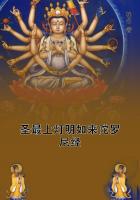McKinstry. She saw it. To her distorted fancy it seemed only a proof of deeper guilt. Without a word she closed the heavy door behind her and swung the huge cross-bar unaided to its place. She then turned and confronted him, wiping the dust from her face and arms with her torn and dangling sun-bonnet in a way that recalled her attitude on the first day he had met her.
"That was Cress with ye?" she said.
He hesitated, still gazing at her in wonder.
"Don't lie."
He started. "I don't propose to," he retorted indignantly. "It was"--"I don't ask ye how long this yer's bin goin' on," she said, pointing to Cressy's sun-bonnet, a few books, and a scattered nosegay of wild flowers lying on the hay; "and I don't want to know. In five minutes either her father will be here, or them hell-hounds of Harrison's who've sold him out will swarm round this barn to git possesshun. Ef this yer"--she again pointed contemptuously to the objects just indicated--"means that you've cast your lot with US and kalkilate to take our bitter with our sweet, ye'll lift up that stack of hay and bring out a gun to help defend it. Ef you're meanin' anythin' else, Ford, you'll hide yourself in that hay till Hiram comes and has time enough to attend to ye."
"And if I choose to do neither?" he said haughtily.
She looked at him in unutterable scorn. "There's the winder--take it while there's time, afore I bar it. Ef you see Hiram, tell him ye left an old woman behind ye to defend the place whar you uster hide with her darter."
Before he could reply there was a distant report, followed almost directly by another. With a movement of irritation he walked to the window, turned and looked at her--bolted it, and came back.
"Where's that gun?" he said almost rudely.
"I reckon's that would fetch ye," she said, dragging away the hay and disclosing a long trough-like box covered with tarpaulin. It proved to contain powder, shot, and two guns. He took one.
"I suppose I may know what I am fighting for?" he said dryly.
"Ye might say 'Cress' ef they"--indicating the direction of the reports--"happen to ask ye," she returned with equal sobriety.
"Jess now ye kin take your stand up thar in the loft and see what's comin'."
He did not linger, but climbed to the place assigned him, glad to escape the company of the woman who at that moment he almost hated.
In his unreflecting passion for Cressy he had always evaded the thought of this relationship or propinquity; the mother had recalled it to him in a way that imperilled even his passion for the daughter; his mind was wholly preoccupied with the idiotic, exasperating, and utterly hopeless position that had been forced upon him. In the bitterness of his spirit his sense of personal danger was so far absorbed that he speculated on the chance bullet in the melee that might end his folly and relieve him of responsibility. Shut up in a barn with a furious woman, in a lawless defence of questionable rights--with the added consciousness that an equally questionable passion had drawn him into it, and that SHE knew it--death seemed to offer the only escape from the explanation he could never give. If another sting could have been added it was the absurd conviction that Cressy would not appreciate his sacrifice, but was perhaps even at that moment calmly congratulating herself on the felicitousness of the complication in which she had left him.
Suddenly he heard a shout and the tramping of horse. The sides of the loft were scantily boarded to allow the extension of the pent-up grain, and between the interstices Ford, without being himself seen, had an uninterrupted view of the plain between him and the line of willows. As he gazed, five men hurriedly issued from the extreme left and ran towards the barn. McKinstry and his followers simultaneously broke from the same covert further to the right and galloped forward to intercept them. But although mounted, the greater distance they had to traverse brought them to the rear of the building only as the Harrison party came to a sudden halt before the closed and barricaded doors of the usually defenceless barn. The discomfiture of the latter was greeted by a derisive shout from the McKinstry party--albeit, equally astonished. But in that brief moment Ford recognized in the leader of the Harrisons the well-known figure of the Sheriff of Tuolumne. It needed only this to cap the climax of the fatality that seemed to pursue him.
He was no longer a lawless opposer of equally lawless forces, but he was actually resisting the law itself. He understood the situation now. It was some idiotic blunder of Uncle Ben's that had precipitated this attack.
The belligerents had already cocked their weapons, although the barn was still a rampart between the parties. But an adroit flanker of McKinstry's, creeping through the tall mustard, managed to take up an enfilading position as the Harrisons advanced to break in the door. A threatening shout from the ambuscaded partisans caused them to hurriedly fall back towards the rear of the barn. There was a pause, and then began the usual Homeric chaff,--with this Western difference that it was cunningly intended to draw the other's fire.
"Why don't you blaze away at the door, you ---- ----! It won't hurt ye!"
"He's afraid the bolt will shoot back!" Laughter from the McKinstrys.
"Come outer the tall grass and show yourself, you black, mud-eating gopher."
"He can't. He's dropped his grit and is sarchin' for it." Goading laughter from the Harrisons.















